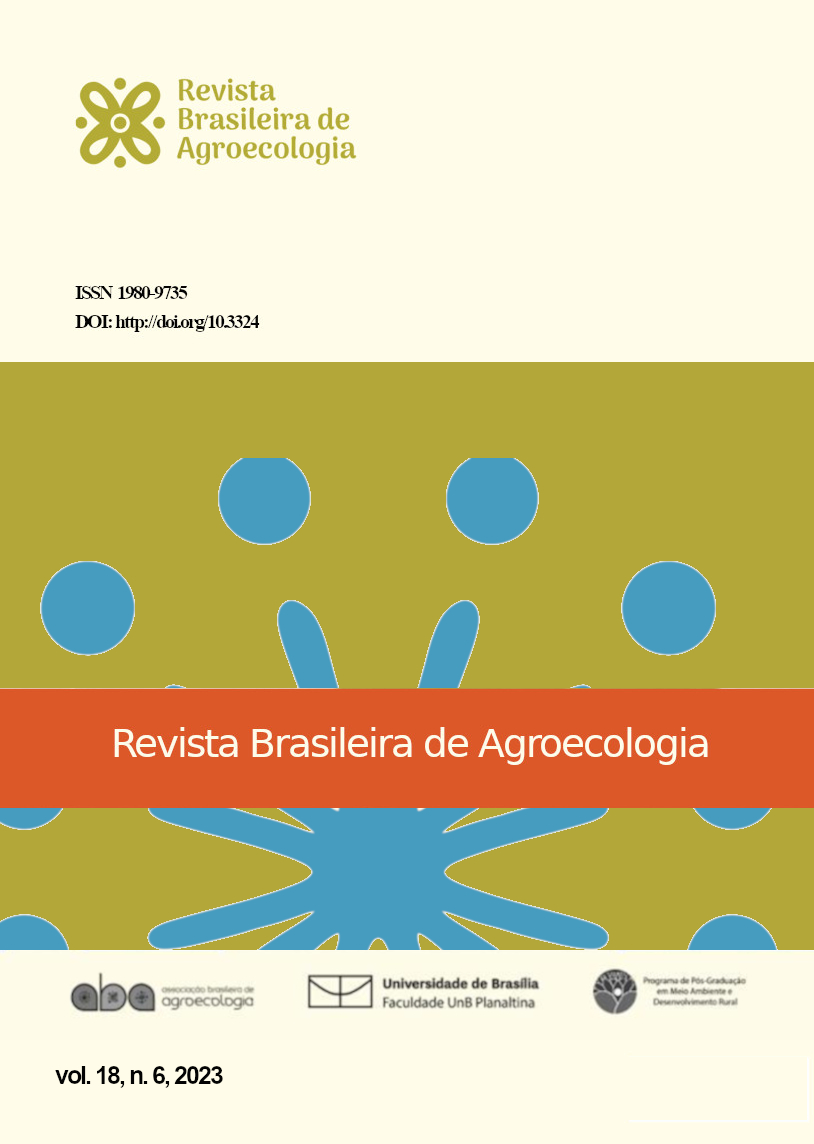Public policies to strengthen the Agroecology as a link between the rural areas and the city: an analysis from the state of Rio de Janeiro
DOI:
https://doi.org/10.33240/rba.v18i6.51592Keywords:
Agroecology, Country-city relationship, State role, Public policAbstract
This research is about public policies that strengthen the Agroecology and the relation between rural areas and cities. With a study about how those policies works in Rio de Janeiro, we aim to meet our main goal: understand how the building of public policies that strengthen the Agroecology can encourage this link between rural areas and cities, making possible the acess to healthy eating in the cities according to food and nutrition security. The applied methodological strategies were bibliographic research and interviews with representatives from the “Articulação de Agroecologia do Rio de Janeiro”. The results found made we understand the Agroecology not only as an alternative to the way of life imposed by the capitalism and the colonialism and as a fundamental element to think health promotion, but also the understanding that public policies that strengthen the Agroecology are mandatory to build new relations.
Downloads
References
ARAÚJO, Flávia, A. V.; SOARES, Beatriz, R. Relação cidade-campo: desafios e perspectivas. Campo -Território, v. 4, p. 1-29, 2009.
BECKER, Cláudio; SILVA, Simone R. Revisitando os conceitos de transição agroecológica e sistemas agroalimentares sustentáveis. In: SOUSA, Carla S.; LIMA, Francisco S.; SABIONI, Sayonara C. (Org.). Agroecologia Métodos e Técnicas para uma Agricultura Sustentável. 1ed.? Guarujá, SP: Científica Digital, 2021, v. 5, p. 274-285.
BRASIL. Presidência da República. Lei nº 8.080, de 19 de setembro de 1990. Dispõe sobre as condições para a promoção, proteção e recuperação da saúde, a organização e o funcionamento dos serviços correspondentes e dá outras providências. Disponível em: http://www.planalto.gov.br/ccivil_03/_ato2004-2006/2006/lei/l11346.htm. Acesso em 17 jan. 2023.
______. Presidência da República. Lei nº 11.346, de 15 de setembro de 2006. Cria o Sistema Nacional de Segurança Alimentar e Nutricional – SISAN com vistas em assegurar o direito humano à alimentação adequada e dá outras providências. Disponível em: http://www.planalto.gov.br/ccivil_03/_ato2004-2006/2006/lei/l11346.htm. Acesso em 07 jun. 2022.
______. Ministério da Saúde. Guia alimentar para a população brasileira. 2. ed. Brasília: Ministério da Saúde, 2014.
CASTRO, Josué, A. Geografia da fome - o dilema brasileiro: pão ou aço. Rio de Janeiro: Edições Antares, 1984.
CÁTEDRA JOSUÉ DE CASTRO. Diálogo sobre ultraprocessados: Soluções para sistemas alimentares saudáveis e sustentáveis. São Paulo: Nupens USP. 2021.
CAZELLA, Ademir, A. et al. Políticas Públicas de Desenvolvimento Rural no Brasil: O Dilema entre Inclusão Produtiva e Assistência Social. Política & Sociedade (Impresso), v. 15, p. 49-79, 2016.
FERREIRA, Joelson; FELÍCIO, Erahsto. Por terra e território: Caminhos da revolução dos povos no Brasil. Arataca: Teia dos Povos, 2021.
GOMES, Romeu. Análise e interpretação de dados da pesquisa qualitativa. In: MINAYO, Maria, C, S. (Org.), DESLANDES, Suely; GOMES, Romeu. Pesquisa Social: Teoria, método e criatividade. Petrópolis: Editora Vozes, 2009, p. 79-108.
IAMAMOTO, Marilda V. Projeto Profissional, espaços ocupacionais e trabalho do(a) Assistente Social na atualidade. Em: Conselho Federal de Serviço Social - CFESS (Org.). Atribuições privativas do/a Assistente Social em questão. [Brasília}: CFESS, 2012, pp. 33-74, 2012.
______. Serviço Social em tempo de capital fetiche: capital financeiro, trabalho e questão social. 9ª. ed. São Paulo: Cortez, 2015.
MINAYO, Maria C.S. (Org.). Pesquisa Social: teoria, método e criatividade. Petrópolis: Editora Cortez, 2002.
MOURA, Clóvis. Dialética radical do Brasil negro. São Paulo: Anita Garibaldi, 1994.
OXFAM. Terrenos da desigualdade: terra, agricultura e desigualdades no Brasil rural. 2016. Disponível em: https://oxfam.org.br/wp-content/uploads/2019/08/relatorio-terrenos_desigualdade-brasil.pdf. Acesso em: 01 fev. 2022.
PREISS, Potira, V. Sistemas agroalimentares saudáveis e sustentáveis: ações territoriais para uma agenda global. In: VALENCIA-PERAFÁN, Mireya E. et al. (Orgs.). Desenvolvimento territorial, sistemas agroalimentares e agricultura familiar. 2. ed. (E-book), São Leopoldo, RS: Oikos, 2022, p. 256-280.
QUINTERO, Pablo; FIGUEIRA, Patricia, CONCHA ELIZALDE, Paz. Uma breve história dos estudos decoloniais. Arte e Descolonização, n. 3, São Paulo: MASP Afterall, 2019.
REDE PENSSAN. II Inquérito Nacional sobre Insegurança Alimentar no Contexto da Pandemia da COVID-19 no Brasil [livro eletrônico]: II VIGISAN: relatório final/Rede Brasileira de Pesquisa em Soberania e Segurança Alimentar – PENSSAN. -- São Paulo, SP: Fundação Friedrich Ebert: Rede PENSSAN, 2022. Disponível em: https://olheparaafome.com.br/. Acesso em 24 jun. 2022.
SCHNEIDER, Sergio. ALMEIDA, Nayla, SALVATE, Natália. A dimensão territorial dos mercados imersos: o caso da manga Ubá em Minas Gerais. In: VALENCIA-PERAFÁN, Mireya E. et al; (Orgs.). Desenvolvimento territorial, sistemas agroalimentares e agricultura familiar. 2. ed. (E-book), São Leopoldo, RS: Oikos, 2022, p. 232-255.
SEYFERTH, Giralda. Colonização, imigração e a questão racial no Brasil. Revista USP, São Paulo, v. 53, p. 117-149, 2002.
Published
How to Cite
Issue
Section
License
Copyright (c) 2023 Cláudio Becker, Raphaela Pimentel Ximenes

This work is licensed under a Creative Commons Attribution 4.0 International License.
Copyright Notice
The copyright of articles published in this journal remains with the authors, with first publication rights for the journal.
License
When published in this open access journal, licensed through CC BY 4.0, articles are distributed free of charge and can be shared and adapted for any purpose, including commercial. As attribution of use, the license requires that due credit be given, with a link to the license and indication of changes. This does not mean that the licensor endorses the use of the information in the article, or the person who used this information. It also implies the impossibility of applying legal or technological measures that restrict the use of the information by third parties.
















